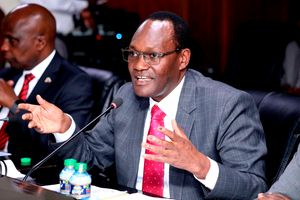
Controller of Budget Dr Margaret Nyakang'o.
The government’s travel budget nearly doubled within three months of a ban imposed to reduce wastage as globetrotting public officials ignored austerity measures.
From October to December 2023, the national government spent Sh7.05 billion on local and foreign travel, a huge increase from Sh4.33 billion in the preceding three months to September.
An October 2, 2023 circular had directed the National Treasury to reduce by half all foreign and local travel budgets, banned non-essential foreign tours as well as limited the size of Kenyan delegations.
Addressed to all senior government officials, including Cabinet Secretaries and Principal Secretaries, the circular by Chief of Staff and Head of Public Service Felix Koskei cited the need to ensure prudent spending of public resources.
However, the latest report by Controller of Budget Margaret Nyakang’o shows that despite the ban, spending on travelling never slowed down, but instead shot up substantially.
Koskei’s circular
In the first six months of the 2023/24 financial year, travelling expenditure amounted to Sh11.38 billion, compared to Sh8.11 billion recorded in a similar period in the 2022/23 financial year.
This comprised Sh7.67 billion for domestic travel and Sh3.71 billion spent on foreign travel between July 1 to December 31, 2023, according to the report released last month.
Another report published in November last year, showed Sh4.33 billion was spent on travel from July to September 2023.
Given the figure for the six months to December was Sh11.38 billion, out of which Sh4.33 billion was spent up to September, it means from October to December 2023, public officials spent another Sh7.05 billion.
A breakdown for the Sh4.33 billion spent in the first three months of 2023/24 financial year — which was more than Sh3.37 billion recorded in a similar period the previous year — comprised Sh3.16 billion (domestic travel) and Sh1.17 billion (foreign travel).
In his circular, Mr Koskei had notified top public officials, including governors and clerks of Parliament as well as county assemblies, of the suspension of non-essential travel. Through the circular, official foreign travel for benchmarking and study visits, trainings, conferences, academic meetings, exhibitions and association meetings was suspended with immediate effect.
Also suspended were sponsored events that require quarter per diem and ticket upgrade, except where the invitee expressly waived the anticipated top-up amount.
Public officers who were due to travel for scheduled events in the banned categories were directed to request for virtual participation where available.
Alternatively, they were to engage the Ministry of Foreign and Diaspora Affairs to secure participation of diplomatic officials in the hosting nations.
“For clarity, foreign missions shall handle all matters and engagements in which Kenya has an interest or has been invited to participate, save for matters in which the line ministries’ direct participation is essential,” states the circular.
The Ministry of Foreign Affairs was directed to reduce by half the number of personnel accompanying the President, First Lady, Deputy President and Prime Cabinet Secretary.
Further, the circular limited the size of delegations for other officials cleared to travel.
Delegations headed by Cabinet Secretaries were to have a maximum of three, including the CS and a technical officer specialised in the subject matter of the foreign engagement.
Critical operations
A similar condition applied for a delegation headed by a governor.
A Principal Secretary could only travel with one other person, according to the circular. A similar condition applied for delegations headed by chairpersons or chief executive officers of constitutional commissions and independent offices.
Chief executive officers and chairpersons of State Corporations were to travel alone.
The circular explained limited public resources had “necessitated the need to scale down and prioritise spending, focusing on the critical operations and activities that are essential to service delivery to the citizens.”
The expenditure on travel has been rising over the years, according to past budget implementation review reports by the Controller of Budget.
From July 1, 2022 to June 30, 2023, which includes the first 10 months of President Ruto’s administration, the total expenditure by ministries, departments and agencies was Sh20.37 billion.
Covid restrictions lifted
It comprised Sh14.04 billion for domestic travel and Sh6.33 billion (foreign). The National Assembly recorded the highest domestic and foreign travel at Sh4.81 billion and Sh1.59 billion, respectively.
In the previous year, July 2021 to June 2022, the travelling expenditure was Sh20.17 billion, an increase from Sh14.23 billion recorded in the 2020/21 financial year. This consisted of Sh14.13 billion (domestic) and Sh6.04 billion (foreign).
At the time, the increment was attributed to the government’s lifting of Covid-19 travel restrictions.
Travel expenses are a big component of budgetary items classified under ‘Use of Goods and Services’ that include printing and advertising, rent and rates for non-residential buildings, training, hospitality, legal fees, insurance as well as maintenance expenses for motor vehicles and other assets.









